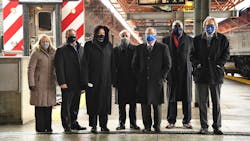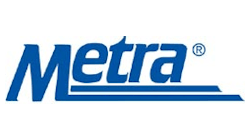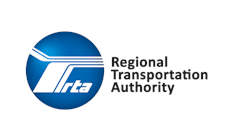Fair Transit South Cook pilot launches on the south side of Chicago
A three-year pilot project that aims to improve transit service and reduce cost for riders on the south side of Chicago, south suburban Cook County and north Will County launched on Jan 4.
The Fair Transit South Cook program, which is made possible by Cook County and its regional transit partners Metra, Pace and the Regional Transportation Authority (RTA), offers riders discounted fares on Metra Electric and Rock Island lines and will see Pace’s 352 Halsted route begin extended service.
“Making transit an easier choice for our south Cook communities is a top priority and I am thrilled we have finally arrived at the point where we can put our vision of a regional transit partnership into action,” said Cook County Board President Toni Preckwinkle. “This is an important component of my administration’s overall focus on equitable policies and programs to ensure that our whole community has the opportunity to prosper.”
Cook County Department of Transportation and Highways (CCDOTH) began planning the pilot program prior to the COVID-19 pandemic, but its launch during the pandemic will help essential workers located in the pilot’s service area.
“With this effort, we are promoting transit equity and supporting essential workers and those most in need. We are making transit an easier choice and a better choice. It’s truly a win-win situation for everyone,” said Metra Board Chair Romayne Brown.
Fair Transit South Cook targets an area of the greater Chicago region where a large percentage of residents spend more than 50 percent of their income on transportation, a large percentage spend more than one hour commuting to work and a large percentage of households do not own a personal vehicle.
“Fair Transit South Cook is an exciting example of collaboration between agencies to improve service, lower costs and achieve real impact for residents with critical transit needs by investing in the current system,” said RTA Board Chairman Kirk Dillard. “This partnership will also provide us with invaluable lessons as we look to our transit system’s post-pandemic recovery and beyond.”
The reduced fares for riders on the Metra Electric and Rock Island lines equate to a 50 percent discount. The pilot program, which was approved by Metra’s board in November, uses an existing reduced fare structure that is extended to all riders. This allowed near immediate implementation of the program on the two participating Metra lines.
Pace’s 352 Halsted Service expansion will improve the hours and frequency of service between the Chicago Transit Authority Red Line 95th/Dan Ryan Station and the Pace Chicago Heights Terminal on weekdays, Saturday and Sunday.
“The Halsted route is carrying more than 2,300 people each day during the pandemic and we’re looking forward to serving even more people with increased frequency and extended hours,” said Pace Board Chair Richard A. Kwasneski.
The Fair Transit South Cook partners note additional improvements to service options will be made as the pilot progresses and the aim of subsequent phases will be to provide seamless transfers between all transit operators.
The pilot program is supported by a $330,000 Accelerating Innovative Mobility grant from the Federal Transit Administration to CCDOTH. In December, the Cook County Board of Commissioners approved $35 million for the program. The funds will be used to offset costs incurred by Metra and Pace associated with the implementation of the program.

Mischa Wanek-Libman | Group Editorial Director
Mischa Wanek-Libman is director of communications with Transdev North America. She has more than 20 years of experience working in the transportation industry covering construction projects, engineering challenges, transit and rail operations and best practices.
Wanek-Libman has held top editorial positions at freight rail and public transportation business-to-business publications including as editor-in-chief and editorial director of Mass Transit from 2018-2024. She has been recognized for editorial excellence through her individual work, as well as for collaborative content.
She is an active member of the American Public Transportation Association's Marketing and Communications Committee and served 14 years as a Board Observer on the National Railroad Construction and Maintenance Association (NRC) Board of Directors.
She is a graduate of Drake University in Des Moines, Iowa, where she earned a Bachelor of Arts degree in Journalism and Mass Communication.






